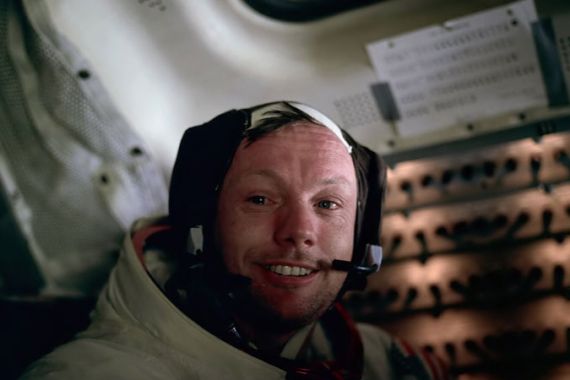Obituary: Neil Armstrong
‘Reluctant American hero’ will forever be remembered as the first person to set foot on the moon on July 20, 1969.

Neil Armstrong, who will forever be remembered as the first person to set foot on the moon, has died aged 82.
Born on August 5, 1930 in Wapakoneta, a small town in the US state of Ohio, Armstrong served as a pilot in the navy from 1949 to 1952.
Keep reading
list of 4 itemsCould shipping containers be the answer to Ghana’s housing crisis?
Are Chinese electric vehicles taking over the world?
First pig kidney in a human: Is this the future of transplants?
He later joined the the National Advisory Committee for Aeronautics (NACA) in 1955 until it became the National Aeronautics and Space Administration (NASA) in 1958.
Armstrong served as an engineer, test pilot, astronaut and administrator with the two agencies for 17 years, according to NASA’s website.
His first mission into space was in 1966 when he was the command pilot for the Gemini 8 mission, which saw the first successful docking of two spacecrafts in orbit.
Three years later, on July 16, 1969, Armstrong and two other astronauts, Buzz Aldrin and Michael Collins, took off aboard the Apollo 11.
Armstrong became the first person to set foot on the moon on July 20, followed closely by Aldrin. Collins stayed behind in orbit.
As hundreds of thousands watched the televised landing, grainy footage showed Armstrong stepping down the ladder of the lunar module.
“That’s one small step for man, one giant leap for mankind,” were Armstrong’s now legendary words as he stepped on the moon’s surface with his left foot.
‘Motivating students’
After the moon landing, Armstrong stayed on with NASA until becoming professor of Aerospace Engineering at the University of Cincinnati in 1971, a position he held for eight years.
Armstrong was known for his reclusiveness and shyness of the media.
However, earlier this year he gave a rare interview to Alex Malley, the executive director of Certified Practicing Accountants of Australia, that was later posted on their website.
“A month before the launch of Apollo 11, we decided we were confident enough we could try and attempt on a descent to the surface,” said Armstrong in the interview.
“I thought we had a 90 per cent chance of getting back safely to Earth on that flight but only a 50-50 chance of making a landing on that first attempt.
“NASA has been one of the most successful public investments in motivating students to do well and achieve all they can achieve.
“It’s sad that we are turning the programme in a direction where it will reduce the amount of motivation and stimulation it provides to young people.”
Collins said through NASA’s senior spokesman, Bob Jacobs: “He was the best, and I will miss him terribly.”
Armstrong is survived by his two sons, a stepson and stepdaughter, 10 grandchildren, a brother and a sister, NASA
said.
Praising Armstrong as a “reluctant American hero,” his family said they were heartbroken and noted that the space pioneer had “served his nation proudly, as a navy fighter pilot, test pilot, and astronaut”.